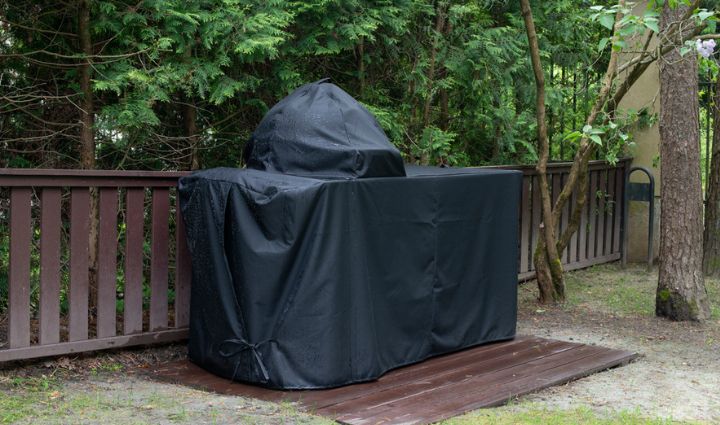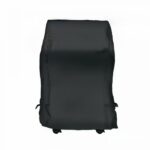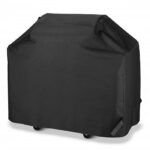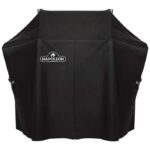Grill covers shield your barbecue from harsh elements, helping to avoid corrosion and other damage so you can keep grilling season after season. Your cover works hard, so how long should a grill cover last?
Designed to protect your grill from snow and rain, UV rays, bird bombs, dust and dirt, and any other potentially damaging debris, grill covers sure can take a beating. But in its role as a protector, a grill cover often doesn’t get a lot of consideration itself, which can leave you with questions about its longevity, durability, and care.
In this post, we will explore everything you need to know about your grill cover and how to care for it, including:
- How long should a grill cover last?
- Do you need a grill cover?
- How to choose the right grill cover
- How to use your grill cover correctly
- How to care for your grill cover
Let’s dig in.
How Long Should A Grill Cover Last?
A grill cover should last 3 to 5 years on average. However, a grill cover’s exact longevity depends on the quality of the material and manufacturing, what it’s exposed to, and how regularly you use it. A high quality grill cover can last upwards of 10 years with proper care (keep reading for more tips on this).
Do You Need A Grill Cover?
Yes, if your grill is located outside you need a grill cover. It will protect your grill from animals, dust and debris, pollen, wind, rain, snow and ice, temperature fluctuations, as well as any chemicals you may use in your yard or garden. A good, well-fitting grill cover helps your grill endure all of these things and ensures your barbecue will last longer as a result.
How To Choose The Right Grill Cover
Choosing the correct grill cover for your barbecue is pretty straightforward, but there are a few things worth considering when you pick them up:
- Size: Your cover should be roughly 2 inches larger than your grill. It should be snug, but not so tight it is difficult to remove, and it should cover the grill fully. Learn more: What Size Grill Cover Do I Need?
- Buckles, straps, or drawcords: Buckles, straps, and drawcords can help secure the cover to your grill and make the fit more snugly. They’re not strictly necessary, but they can offer added protection and they are especially useful for securing the grill cover if you live in an area prone to high winds.
- Material: Is the material waterproof, UV-resistant, and wind-resistant? Thick, durable materials like vinyl, polyester, or nylon are often the best materials for grill covers, so long as they are also water-repellent (or at least water-resistant), as well as UV- and tear-resistant. Regardless of which type you select, make sure you avoid anything that is felt- or flannel-lined because this will attract rodents who will use the lining as nesting material.
- Vents: So long as they are positioned correctly, vents can help reduce humidity and allow wind to blow through the cover, which can prevent moisture buildup and ice formation. When putting a vented grill cover onto your grill, take care that the vents are not positioned in such a way that they allow rain to enter and pool on your grill.
Branded grill covers vs generic brand grill covers
Branded grill covers are built for the grills that share their names. Usually embroidered with the manufacturer’s logo, these covers are more expensive than generic grill covers, but they are designed to fit specific models. This takes the guess-work out of cover selection, and ensures that your cover will fit properly.
Universal-fit grill covers are a great alternative to branded covers. Minus the big-brand-name logo, these generic covers offer a similar level of protection but at a lower price. Universal fit covers come in a variety of sizes, so be sure to measure your grill before making a purchase. Be wary if the cover is too cheap—this is usually indicative of lower quality materials that won’t last. Lastly, if possible (this goes for branded covers too), read reviews before you make your selection to ensure you are getting a high-quality cover.
Shop grill covers by brand:
How To Use Your Grill Cover Correctly
The best practice is to cover your grill after every use once it has cooled down and you have properly cleaned it.
Contrary to some beliefs, a cover does not encourage rust unless you live in a very humid area, but it isn’t harmful and can even be beneficial to leave your grill uncovered on occasion. In general, follow these tips for covering your grill to see the best results:
- If you live in a humid climate, you should select a grill cover with vents for airflow to assist in releasing excess humidity, or leave your grill uncovered on especially humid days.
- If you live in a climate that experiences heavy rain and snow, or other inclement weather, you should cover your grill after every use once it has cooled.
- If you forget to cover it once (or several times) in a rainstorm, don’t worry about it. Just make sure you wipe it down and let it dry thoroughly before covering it again.
- If you live anywhere that is constantly dry, you’re safe to leave the grill uncovered when you’re routinely using it, but be sure to cover it on windy days to protect it from dust or debris, or if it will not be used for more than a few days.
How To Care For Your Grill Cover
Due to the protective nature of their materials and manufacturing, grill covers don’t typically require a lot of care themselves. To ensure your grill cover lasts as long as possible, follow these tips:
- Take care when removing it and putting it on your grill so you don’t snag or tear it.
- Store it somewhere that it will not be stepped on or damaged.
- Repair any fraying as you see it.
- Spot clean it when you notice marks.
- Routinely spray it down with cold water and let it dry in the sun.
- Do not use chemicals or soaps to clean it unless the manufacturer recommends them.
- Clean your grill thoroughly before covering it ahead of seasonal storage.
Conclusion
A cheap grill cover may last a single season, but a typical grill cover can last you several years before you require a new one—as long as you take the time to care for both the cover and the grill.












